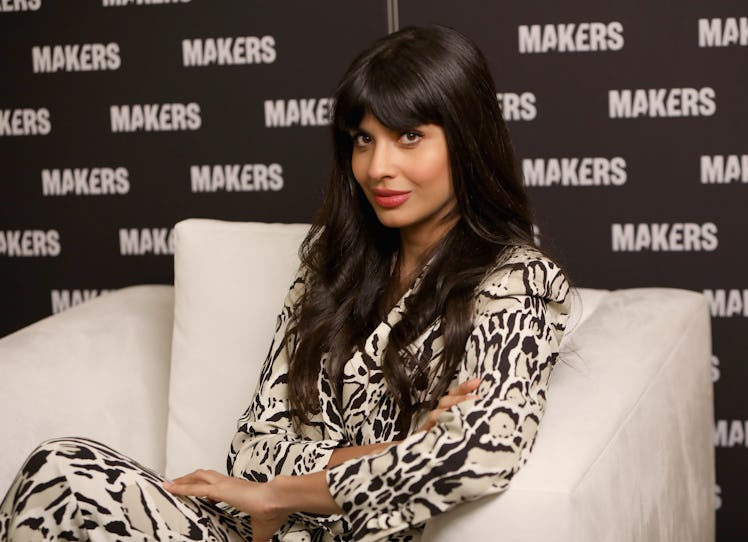
Jameela Jamil Started A Petition To Take "Toxic Diet Product" Promotions Off Social Media
Even if you aren’t actively checking social media throughout the day, I’m sure you’ve noticed a few promotional posts for various diet products peppered into your feed — as if diet culture wasn't already obnoxious enough, right? It’s not just the brands themselves that are advertising these supplements, though; celebrities and influencers alike have started promoting all kinds of questionable pills, powders, teas, and wellness programs. But the problem is, these products aren’t actually regulated by the FDA, meaning consumers like you don't truly know what's in them, which is why Jameela Jamil’s petition to take “toxic diet product” promotions off social media is so important. It’s bringing awareness to an issue that needs to be solved ASAP — an issue that even the FDA is now making moves to amend.
According to an announcement issued by FDA commissioner, Scott Gottlieb, MD, on Feb. 11, 2019, for the first time in over 25 years, the federal agency is cracking down on its dietary supplements regulation policies. “What was once a $4 billion industry comprised of about 4,000 unique products, is now an industry worth more than $40 billion, with more than 50,000 – and possibly as many as 80,000 or even more – different products available to consumers,” Gottlieb stated. The resulting problem here is that it’s become almost impossible to identify safe, legitimate products from supplements that are potentially dangerous for consumers’ health.
"We know that most players in this industry act responsibly," Gottlieb continued in his statement. "But there are opportunities for bad actors to exploit the halo created by quality work of legitimate manufacturers to instead distribute and sell dangerous products that put consumers at risk.”
Getting a better grasp on the dietary supplement industry might start with the FDA calling out products that can potentially pose a risk to your health, and establishing a stronger line of communication with consumers to voice their concerns as they come about — all of which Gottlieb seems to be working to put into practice — but it continues with people like Jamil putting social media promotions of these products on blast, too. To make her voice heard, the British actress and activist posted a screenshot of her Change.org petition on Instagram.
“Please sign and share this petition wherever you can so we can get these bullsh*t diet/detox products off social media, where they are being peddled to unsuspecting young people who genuinely believe they will look like their idols if they take that sh*t,” Jamil captioned the photo. “They don’t know about photoshop, surgeons, personal trainers and chefs and starvation diets all of which are how you achieve the aesthetic you are being sold.”
As of writing this article, it's only been about a week since the The Good Place star launched her petition, and yet she's already secured nearly 140,000 signatures. “[Dietary products are] flogged in glossy paid adverts by celebrities and influencers with no expertise or authority in nutrition/medicine/biology,” Jamil wrote in her call to action. “Celebrities who promote and endorse weight loss aids for payment, do so because brands have realised how influential their posts are with young people,” she continued, which is exactly why she's demanding that platforms like Instagram, Twitter, Facebook, and Snapchat filter out these sorts of posts.
Look, even if you do realize that a lot of what’s promoted on social media is photoshopped and/or sensationalized, it can still be easy to take whatever your favorite celebrities and influencers say as fact, and to feel a bit lost in how you should go about doing your own research on these products. But the thing is, while it’s definitely important for the FDA to re-evaluate their regulation policies for these types of supplements, and for social media platforms to be made aware of the issue, at the end of the day, it's just as important to remember that you have complete control over what you put into your body. You have the ability to look past the filtered images, learn about what these products are actually made of, and consider how they might affect you.
It's certainly not easy to do this, but if you need some quick tips on how to tell a BS wellness product from a legit one, Nora Minno, a registered dietitian, certified dietitian/nutritionist, and certified personal trainer based in New York City, has a couple of pointers: "If it is a supplement and claims to cure, treat, or prevent, rather than support, then steer clear," she tells Elite Daily. "Any product that promises a dramatic result in a short amount of time (e.g. lose 20 pounds in two weeks), claims to have a function that goes against normal bodily response (e.g. suppress appetite), or claims to cure a disease (e.g. cure Alzheimer's or cancer), are products you should steer clear of."
Of course, it's still easy to get confused by all the medical jargon out there that you might see on ingredients labels. So if you’re interested in a certain product, but you're unsure of whether it’s actually safe to put into your body, Minno highly suggests speaking with a doctor, as well as referencing the National Sanitation Foundation’s supplement and sports product verifications, “to ensure that what's on the label is what's actually in the product, that products pass a toxicology test, and that products are free from harmful levels of contaminants," she explains.
Remember, your own personal knowledge is more powerful than any influencer post on social media. Do your research, talk to your doctor, and consider signing Jamil's petition at change.org.